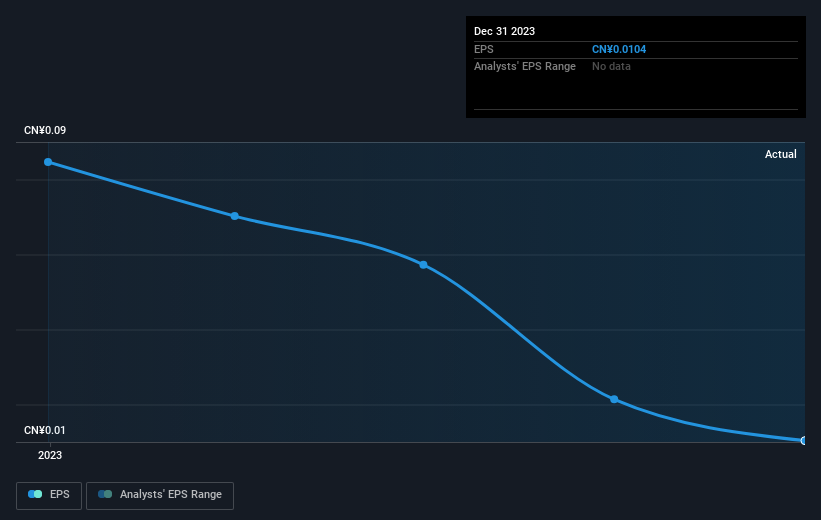
Rego Interactive Co., Ltd (HKG:2422) shareholders should be happy to see the share price up 18% in the last week. But in truth the last year hasn't been good for the share price. The cold reality is that the stock has dropped 43% in one year, under-performing the market.
On a more encouraging note the company has added HK$105m to its market cap in just the last 7 days, so let's see if we can determine what's driven the one-year loss for shareholders.
See our latest analysis for Rego Interactive
While the efficient markets hypothesis continues to be taught by some, it has been proven that markets are over-reactive dynamic systems, and investors are not always rational. By comparing earnings per share (EPS) and share price changes over time, we can get a feel for how investor attitudes to a company have morphed over time.
Unfortunately Rego Interactive reported an EPS drop of 88% for the last year. This fall in the EPS is significantly worse than the 43% the share price fall. It may have been that the weak EPS was not as bad as some had feared. With a P/E ratio of 52.19, it's fair to say the market sees an EPS rebound on the cards.
The image below shows how EPS has tracked over time (if you click on the image you can see greater detail).

It's probably worth noting that the CEO is paid less than the median at similar sized companies. It's always worth keeping an eye on CEO pay, but a more important question is whether the company will grow earnings throughout the years. Dive deeper into the earnings by checking this interactive graph of Rego Interactive's earnings, revenue and cash flow.
What About The Total Shareholder Return (TSR)?
We'd be remiss not to mention the difference between Rego Interactive's total shareholder return (TSR) and its share price return. The TSR is a return calculation that accounts for the value of cash dividends (assuming that any dividend received was reinvested) and the calculated value of any discounted capital raisings and spin-offs. Rego Interactive hasn't been paying dividends, but its TSR of -32% exceeds its share price return of -43%, implying it has either spun-off a business, or raised capital at a discount; thereby providing additional value to shareholders.
A Different Perspective
Given that the market gained 3.0% in the last year, Rego Interactive shareholders might be miffed that they lost 32%. However, keep in mind that even the best stocks will sometimes underperform the market over a twelve month period. It's great to see a nice little 16% rebound in the last three months. Let's just hope this isn't the widely-feared 'dead cat bounce' (which would indicate further declines to come). While it is well worth considering the different impacts that market conditions can have on the share price, there are other factors that are even more important. Case in point: We've spotted 4 warning signs for Rego Interactive you should be aware of, and 1 of them is a bit unpleasant.
Of course Rego Interactive may not be the best stock to buy. So you may wish to see this free collection of growth stocks.
Please note, the market returns quoted in this article reflect the market weighted average returns of stocks that currently trade on Hong Kong exchanges.
Have feedback on this article? Concerned about the content? Get in touch with us directly. Alternatively, email editorial-team (at) simplywallst.com.
This article by Simply Wall St is general in nature. We provide commentary based on historical data and analyst forecasts only using an unbiased methodology and our articles are not intended to be financial advice. It does not constitute a recommendation to buy or sell any stock, and does not take account of your objectives, or your financial situation. We aim to bring you long-term focused analysis driven by fundamental data. Note that our analysis may not factor in the latest price-sensitive company announcements or qualitative material. Simply Wall St has no position in any stocks mentioned.
Have feedback on this article? Concerned about the content? Get in touch with us directly. Alternatively, email editorial-team@simplywallst.com